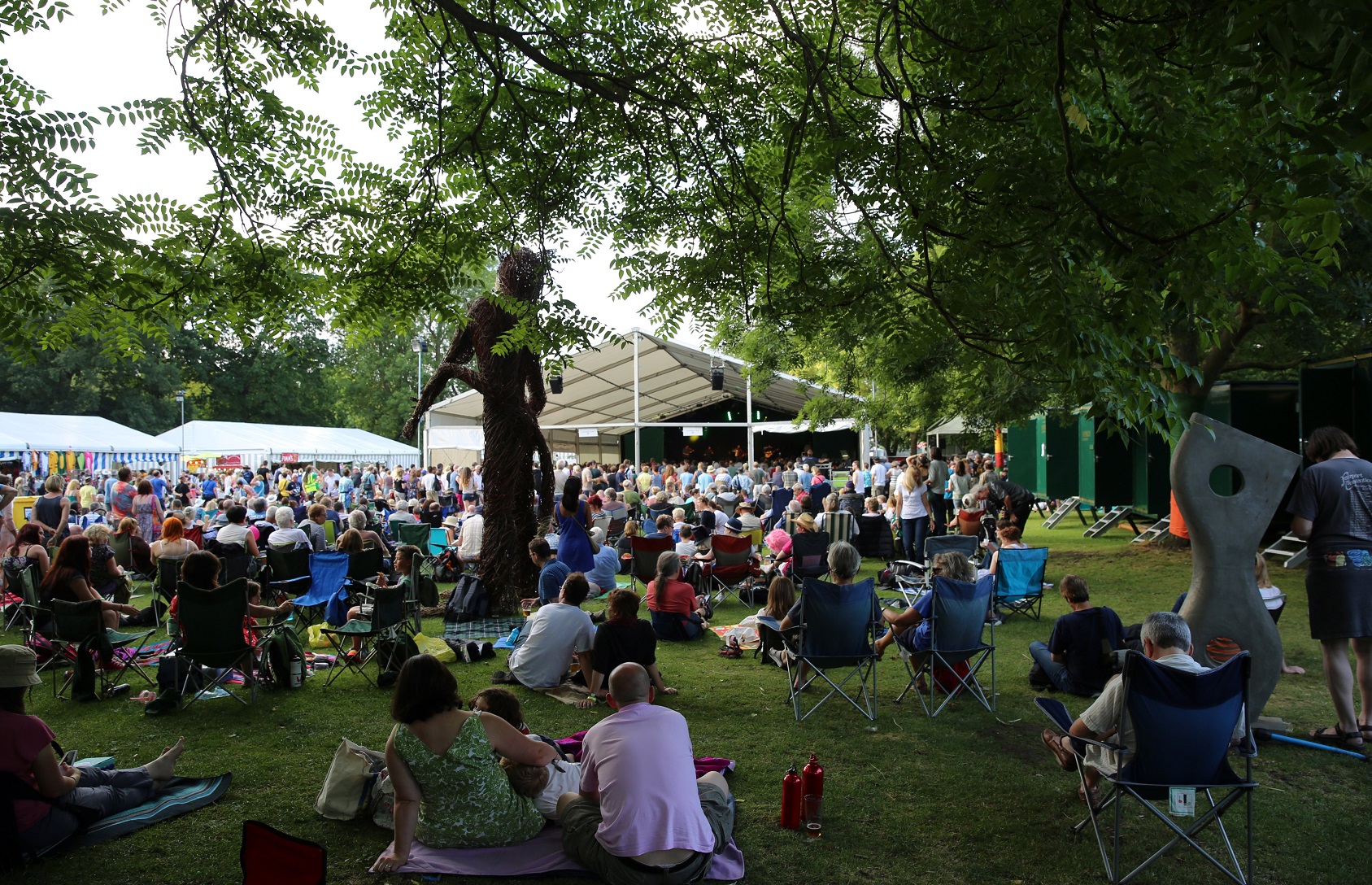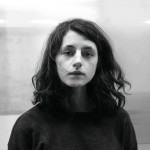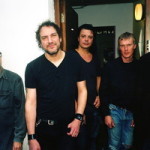Under an exquisitely warm summer sky and right on the stroke of 6.00pm, The Brass Funkeys and Jamie Smith’s Mabon in the Club Tent and on Stage 2 respectively announce that the 2013 Cambridge Folk Festival has begun in earnest. Now in its 49th consecutive year the event is well and truly established as one of the longest running and most famous folk festivals in the world. Located just to the south east of Cambridge city centre and set in the beautiful grounds of the Grade II listed Victorian country house that is Cherry Hinton Hall, the festival has evolved from its more humble traditional folk roots to embrace a much wider interpretation of that musical term whilst still managing to stay true to its more conventional origins.
Thursday evening’s musical line-up is a perfect illustration of just how the festival has managed to move with the times, defy trends 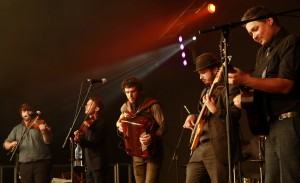 and yet maintain that often uneasy balance which lies between the old and new. And in this regard, joint opening act Jamie Smith’s Mabon is but one case in point. Six young men who draw their influences and inspiration from a wide range of more traditional Celtic sources, they produce a rousing sound driven by fiddle, guitar and Smith’s swirling accordion that ultimately feels fresh and alive. The Brass Funkeys are another troupe of musicians who cross national and cultural boundaries with their music. They fuse the spirit of New Orleans marching bands to more contemporary styles and do it to no little effect; their reading of The White Stripes’ ‘Seven Nation Army’ exemplifies this amalgam of old and new.
and yet maintain that often uneasy balance which lies between the old and new. And in this regard, joint opening act Jamie Smith’s Mabon is but one case in point. Six young men who draw their influences and inspiration from a wide range of more traditional Celtic sources, they produce a rousing sound driven by fiddle, guitar and Smith’s swirling accordion that ultimately feels fresh and alive. The Brass Funkeys are another troupe of musicians who cross national and cultural boundaries with their music. They fuse the spirit of New Orleans marching bands to more contemporary styles and do it to no little effect; their reading of The White Stripes’ ‘Seven Nation Army’ exemplifies this amalgam of old and new.
Once upon a time Kathryn Roberts and Sean Lakeman were one half of Equation (the other two quarters being Kate Rusby and Lakeman’s younger brother Seth). Whilst the stars of the other two have since shined ever so brightly in the modern folk firmament, Kathryn Roberts and Sean Lakeman have largely gone unnoticed. Quite why this should be so is very difficult to 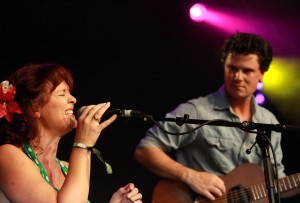 explain after seeing and hearing this performance. Lakeman’s guitar is consistently impressive, providing the most noble of platforms for the versatility of his wife’s voice. Roberts breathes confidence, sensitivity and sensuality into her delivery and is equally at ease with a more vibrant traditional English song as she is with a quieter reflective ballad. Their interpretation of Tom Waits’ ‘Georgia Lee’, the closing song in a most memorable of sets, is deeply haunting.
explain after seeing and hearing this performance. Lakeman’s guitar is consistently impressive, providing the most noble of platforms for the versatility of his wife’s voice. Roberts breathes confidence, sensitivity and sensuality into her delivery and is equally at ease with a more vibrant traditional English song as she is with a quieter reflective ballad. Their interpretation of Tom Waits’ ‘Georgia Lee’, the closing song in a most memorable of sets, is deeply haunting.
If he were a movie star this man would be Randolph Scott in ‘Ride the High 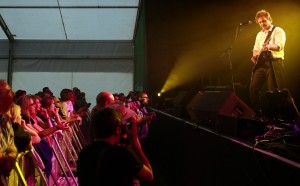 Country’; a softly spoken stranger, a symbol from a long-forgotten bygone age, a man out of time. And if he were an automobile he would be a station wagon; practical, reliable and unflashy. But as is he is a musician his name is Willy Mason, a man for whom the word laconic was surely invented. There is nothing rushed about Mason. He just plugs in, moves slowly across the open landscape of his songs – ‘Fear No Pain’ and ‘We Can Be Strong’ are majestic – and then quietly goes, leaving nothing other than a hushed reverence in his wake.
Country’; a softly spoken stranger, a symbol from a long-forgotten bygone age, a man out of time. And if he were an automobile he would be a station wagon; practical, reliable and unflashy. But as is he is a musician his name is Willy Mason, a man for whom the word laconic was surely invented. There is nothing rushed about Mason. He just plugs in, moves slowly across the open landscape of his songs – ‘Fear No Pain’ and ‘We Can Be Strong’ are majestic – and then quietly goes, leaving nothing other than a hushed reverence in his wake.
Lucy Rose continues to travel further and further away from her pastoral folk beginnings. She confesses to being very nervous this evening, worrying that this particular audience may not care for what she 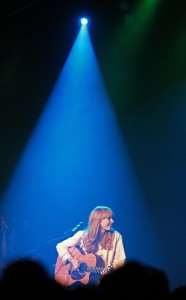 describes as her now “rockier sound”. Judging by her reception, she needn’t have worried. Opening with ‘Inverness’ and closing with ‘Bikes’, when compared with twelve months ago the material now sounds lived-in, energised and truly road-tested. Similarly Rose seems more assured, the gaucheness of her hitherto girl-next-door image transformed into an English Françoise Hardy for the present day.
describes as her now “rockier sound”. Judging by her reception, she needn’t have worried. Opening with ‘Inverness’ and closing with ‘Bikes’, when compared with twelve months ago the material now sounds lived-in, energised and truly road-tested. Similarly Rose seems more assured, the gaucheness of her hitherto girl-next-door image transformed into an English Françoise Hardy for the present day.
In some strange parallel, Lucy Rose’s metamorphosis mirrors the journey of Cambridge Folk Festival. Over a much longer gestation period, the festival has also changed. As it stands a year away from its half-century celebrations its continuing success owes much to its wonderful setting, excellent organisation and that often used though in this case entirely accurate descriptor, friendly atmosphere. But these factors would ultimately count for precious little if they were not harnessed to a consistently imaginative programming of events which marries the distinguished heritage of the very best in folk traditions with the boldness and innovation of fresh ideas and contemporary music.
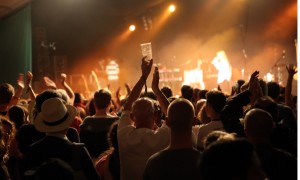
This year’s Cambridge Folk Festival continues until 28th July 2013. Full details can be found here:
http://www.cambridgefolkfestival.co.uk/

